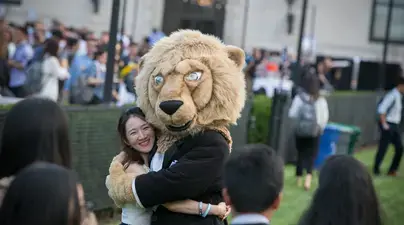
Student Life
The Office of Student Life aims to immerse students in professionally-grounded student activities that foster development through community engagement and networking. We ensure our students are represented in the SPS Student Government and the Columbia University Senate.
The SPS student governance group – SPSSG – and student organizations and clubs, demonstrate exemplary student leadership, commitment, passion, and industry engagement. SPSSG has a sub-committee called the President’s Council. The President’s Council is composed of the presidents of student clubs and associations at Columbia SPS. The goal of the Council is to brainstorm on new initiatives for the Columbia SPS community, to encourage collaboration between student clubs, and to communicate respective club and association programming to avoid event overlap.
Student Engagement Opportunities
SPS Engage
SPS Engage, powered by CampusGroups, is the one stop-spot for events, student organizations, and school resources at SPS! Be sure to bookmark this website and download the app and visit it often!
Columbia University Senate
The Senate is a University-wide legislature, representing faculty, students, and other constituencies. It makes policy on a range of issues that affect the entire University or more than one school, including educational programs and priorities, the budget, academic freedom and tenure, the conduct of research, the libraries, information technology, Columbia's external relations, student sexual misconduct, rules governing political demonstrations, and the welfare of faculty, students, and research officers. Trustee concurrence is required for acts of the Senate.
If you’re interested in running for Columbia SPS Student Senator or learning more about the University Senate role, please click here.
If you’re interested in participating in the senate, but not as a senator, you can do so by joining different senate committees. For more information, click here.
SPS Student Government (SPSSG)
SPSSG is the School's student government association, and the group is essential to the continuance of high standards of academic excellence and professional leadership. Comprised of Representatives from each Master's Program within the School of Professional Studies, the organization strives to:
- Improve the quality of students’ academic, professional, social, and personal development while at Columbia University SPS
- Act as liaison between the students and the faculty/administration
- Advocate the incorporation of student views and opinions in the formulation of policies and procedures governing Columbia University SPS
- Promote and fund student-initiated academic, professional, personal development, and social programs
SPS Student Government Elections are held every September and in the spring semester, if necessary. The Office of Student Life coordinates these elections and students will receive information on how to nominate peers, how to run for office, and how to vote. Learn more here!
Officially Recognized Student Clubs
SPS Student Organizations represent the many interests of the SPS student body and degree programs. These groups and their programming are geared toward professional development, social engagement, and academic enrichment. Our student organizations provide ways to learn more about different industries and connect with SPS alumni and faculty. Learn more about SPS Student Organizations and their events on SPS Engage!
Other Engagement Opportunities
Students at SPS have opportunities to engage across the University community. Please see below for committee or task force opportunities:
- The Advisory Committee on Socially Responsible Investing (ACSRI): SAC issues a call for applications once a year in general, reviews applications and interviews short-listed candidates. It submits its final list of nominees to ACSRI, which will then interview nominees and confirm appointments. Appointments are for two-years, with monthly meetings from September to March, followed by weekly meetings through to the end of the spring semester. ACSRI is independent of the Senate and reports to the Senate annually. It submits its recommendations directly to the University Trustees for their consideration and approval. Learn more here!
- The Gender Based Misconduct Prevention Task Force is focused on programming and other efforts to reduce the incidence of sexual assault, sexual harassment and other gender-based misconduct at Columbia. Read their most recent report here.
- Presidential Advisory Committee on Sexual Assault (PACSA): PACSA is charged with advising the president on issues related to the prevention of and response to gender-based misconduct, including sexual assault, and reports to the Senate annually. PACSA has three student members: one undergraduate student, one graduate student, and one member of SAC. SAC will seek applications form among the students active in this policy-area and engaged with this issue, and members serve a two-year term. Learn more about the PACSA here.
- Task Force on Inclusion and Belonging, organized by University Life, works to identify issues and develop responsive strategies that address students’ experiences both in and outside of the classroom related to diversity, inclusion and a sense of belonging on campus. All students, staff, and faculty are welcome to join this task force. The task force reports can be found on their website along with a link for SPS members interested in joining. Learn more here!
- University Judicial Board (UJB): This five-member University-wide hearing panel hears charges of violations under the Rules of University Conduct and provides sanctions. In addition to the five members there are 10 alternates who are called on should a member not be available. The 15 total members include five students (all nonsenators), five faculty members and five non-instructional officers (librarians, research officers and administrative staff. The UJB has had two student members in each year since its creation as well as a student vice chair. Early-fall, SAC issues a public call for applications, reviews the applications received and short-lists candidates for interview. Following a round of interviews, SAC's list of nominees is then submitted to the Executive Committee of the Senate for confirmation. All members are asked to serve a three-year term, but a number of new appointments are made each year as students graduate or study abroad. Learn more about the UJB and the Rules of University Conduct here.
- Interschool Governing Board (IGB): The Interschool Governing Board (IGB) was initiated by the Student Affairs Committee of the Columbia University Senate in direct response to the specific student concerns and expressed needs of student groups whose composition and mission do not fall under the immediate jurisdiction of already existing governing boards or individual school councils for recognition and funding by Columbia. The IGB is dedicated to supporting such student organizations in their efforts to bridge gaps between various academic disciplines at Columbia by creating a dynamic sense of community that facilitates multi-disciplinary programming and dialogue. The IGB is part of Columbia’s student government responsible for recognizing and funding student groups on campus not already covered by a school, program, student council or government, the Activities Board at Columbia, or the Student Governing Board. Our groups have a broad range of functions, including pre-professional, academic, competition, cultural, special interest, performance, publication, media, performing arts and large scale events. Learn more here!



